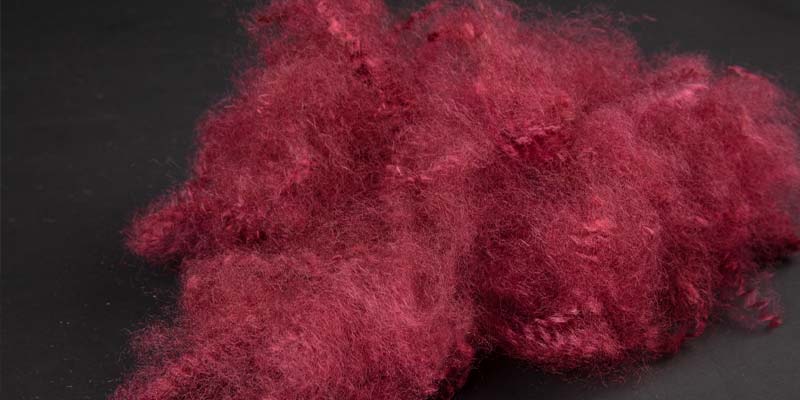This article will specifically focus on Polyester Staple Fibers and is part of Zarif Carpets‘ collection of articles related to staple fiber. Discover more articles related to this subject on our ‘All About Staple Fiber‘ page.
If you are not familiar with the topic of staple fiber, we recommend checking out our guide ‘Staple Fiber: What You Should Know‘ first.
What is Staple Fiber?
In the textile industry, “Fiber” refers to the basic unit of raw material from which textiles are made. Fibers are slender, thread-like structures that can be natural or synthetic. They are used to create yarns and fabrics. Staple fiber is a term used in the textile industry to describe a type of fiber that is relatively short in length compared to continuous filament fibers (staple fiber and filament fibers are opposite terms). These fibers are typically measured in inches or millimeters, whereas continuous filament fibers can be much longer, extending for thousands of meters.
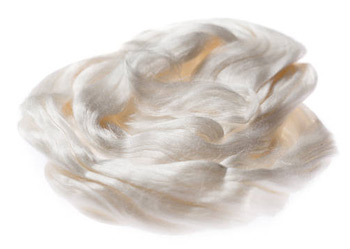
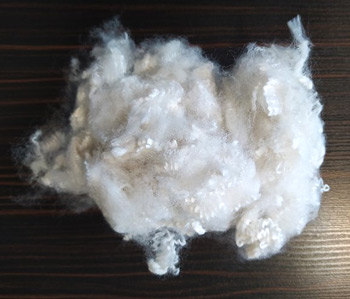
If you are interested in getting more information about staple fibers, visit our ‘Staple Fiber: What You Should Know‘ article.
Main Material of synthetic Staple Fibers
Synthetic staple fibers are primarily made from materials such as polyester or polypropylene. These fibers find extensive use in various industries, particularly in carpet factories, including both machine-made and wall-to-wall carpets.
Types of Polyester Staple Fiber
Polyester staple fibers are categorized into two main types: Recycled and Virgin. Recycled fibers are produced from recycled polyester obtained from recycling plastic bottles, while virgin fibers are manufactured directly from polyester.
Virgin and Recycled polyester fibers have many differences in usage, prices and even production line. In summary Virgin fibers are Commonly used in high-performance textiles, where specific properties and quality standards are essential. On the other hand, Recycled ones are widely used in eco-friendly and sustainable products, such as clothing, home textiles, and other consumer goods. Consequently Virgin polyesters are generally more expensive than Recycled ones, however the latter offres more environmentally friendly characteristics.
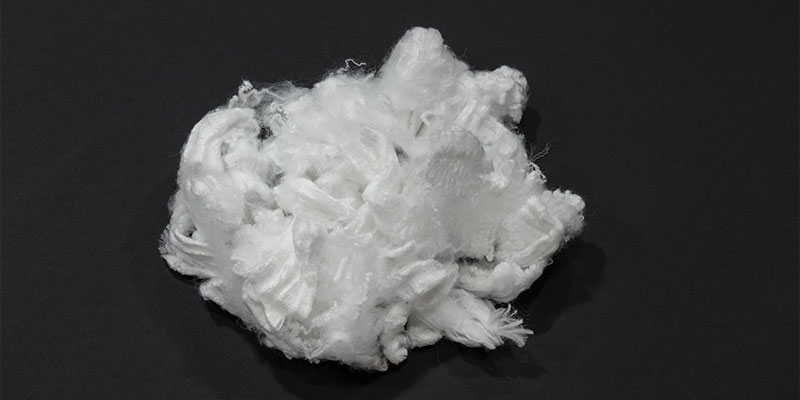
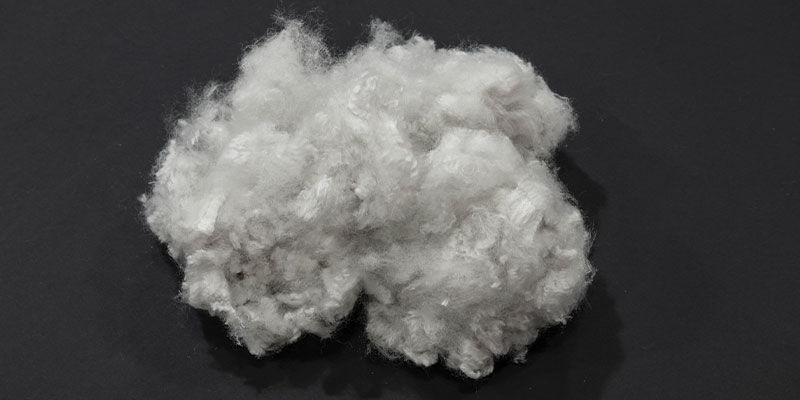
What Is Polyester Hollow Staple Fiber?
Polyester hollow staple fiber is a type of fiber that can be either recycled or virgin. It is crafted with a hollow area in the middle of each strand, making it lightweight and suitable for special applications, such as cloth. The following image will aid in a better understanding of this term:
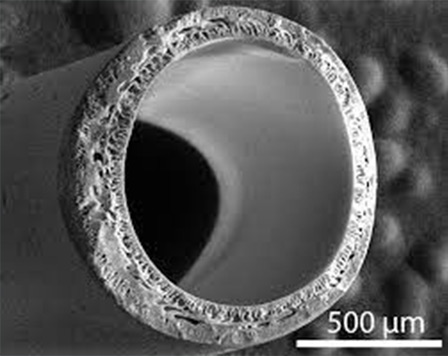
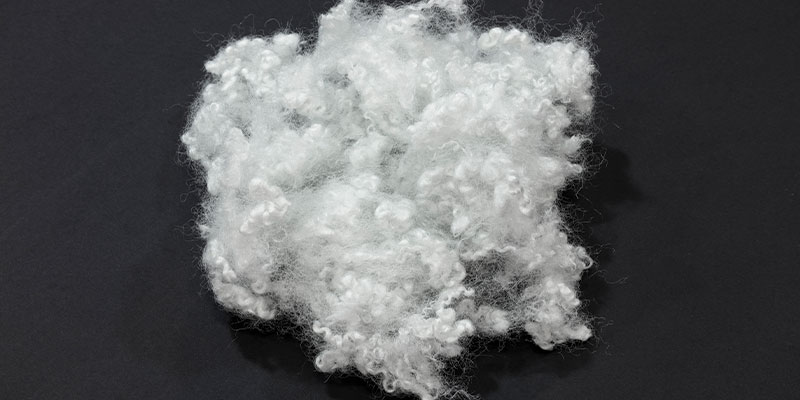
Check out our article, Hollow Staple Fibers: What You Should Know, to gather comprehensive information about hollow staple fibers.
Main Characteristics of Polyester Staple Fiber
Here are some main Characteristics of polyester staple fiber:
Color: Polyester staple fibers can be produced in a variety of colors; however, they are commonly found in a colorless or neutral state.
Denier Grade: Denier is a unit of measurement for the thickness of fibers. In other words, it defines how thick each strand of fiber is.
Cut Length: This factor indicates the length of each strand, measured in inches or millimeters.
Usage of Polyester Staple Fiber
Here are some common usages of polyester staple fiber:
Textiles and Apparel
Polyester staple fibers are extensively used in the textile industry for producing a variety of fabrics, including clothing, sportswear, activewear, and fashion accessories. The fibers provide durability, wrinkle resistance, and colorfastness.
Home Furnishings
Bedding, curtains, upholstery, and carpets often incorporate polyester staple fibers. These fibers contribute to the durability and affordability of these home furnishings, and they may have properties such as stain resistance.
Non-Woven Fabrics
Non-woven fabrics, used in products like disposable diapers, wipes, and medical textiles, often contain polyester staple fibers. The fibers contribute to the strength, softness, and absorbency of these products.
Industrial Applications
Polyester fibers are used in industrial applications for filtration, insulation, and reinforcement purposes. They are employed in manufacturing filters, geotextiles, and composite materials.
Outdoor and Recreational Gear
Polyester staple fibers are commonly used in the production of outdoor and recreational gear, including jackets, sleeping bags, tents, and backpacks. The fibers provide water resistance, quick-drying properties, and durability.
Automotive Interiors
The automotive industry utilizes polyester staple fibers in the production of car interiors, such as seat fabrics and carpets. The fibers contribute to comfort, durability, and resistance to wear and fading.
Fiberfill and Stuffing Materials
Polyester staple fibers are a popular choice for filling materials in pillows, cushions, stuffed toys, and comforters. They offer resilience, hypoallergenic properties, and a lightweight feel.
Geotextiles
In civil engineering and construction, polyester staple fibers are used in geotextiles for applications such as soil stabilization, erosion control, and drainage.
Medical Textiles
Polyester fibers are used in the production of packaging materials, including straps and wraps. They contribute to the strength and stability of packaging solutions.
Packaging Material
Polyester fibers are employed in the production of medical textiles, such as surgical gowns, masks, and wound dressings. The fibers may be chosen for their strength, breathability, and resistance to moisture.
Filter Media
Polyester staple fibers are used in the manufacturing of filter media for air and water filtration applications. They provide efficient filtration and can be engineered for specific filtration needs.
Production Line of Polyester Staple Fiber
For a better perspective, we have included a video showcasing Zarif Mosavar‘s production line of polyester staple fiber. As the export department of Zarif Mosavar Industrial Group, Zarif Carpets offers both virgin and recycled polyester staple fibers, including hollow fibers, to customers worldwide.
Final Words
Polyester staple fibers play a crucial role in the textile and manufacturing industries, providing a wide range of properties and applications for different consumer and industrial needs. Advances in fiber technology continue to expand the possibilities for staple fibers in various products and applications.
Stay informed about the latest Zarif Carpets’ staple fibers and other products by following our LinkedIn page.

